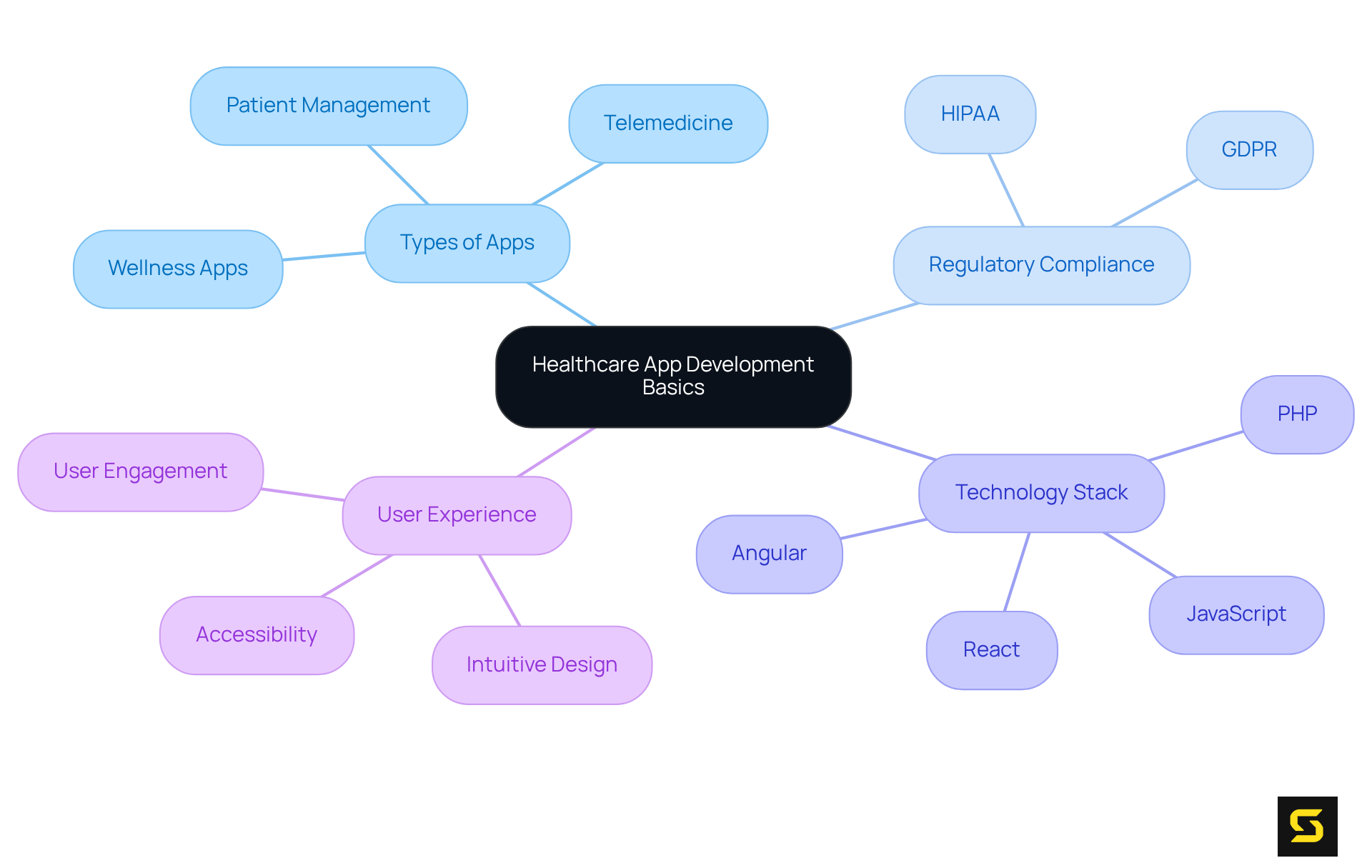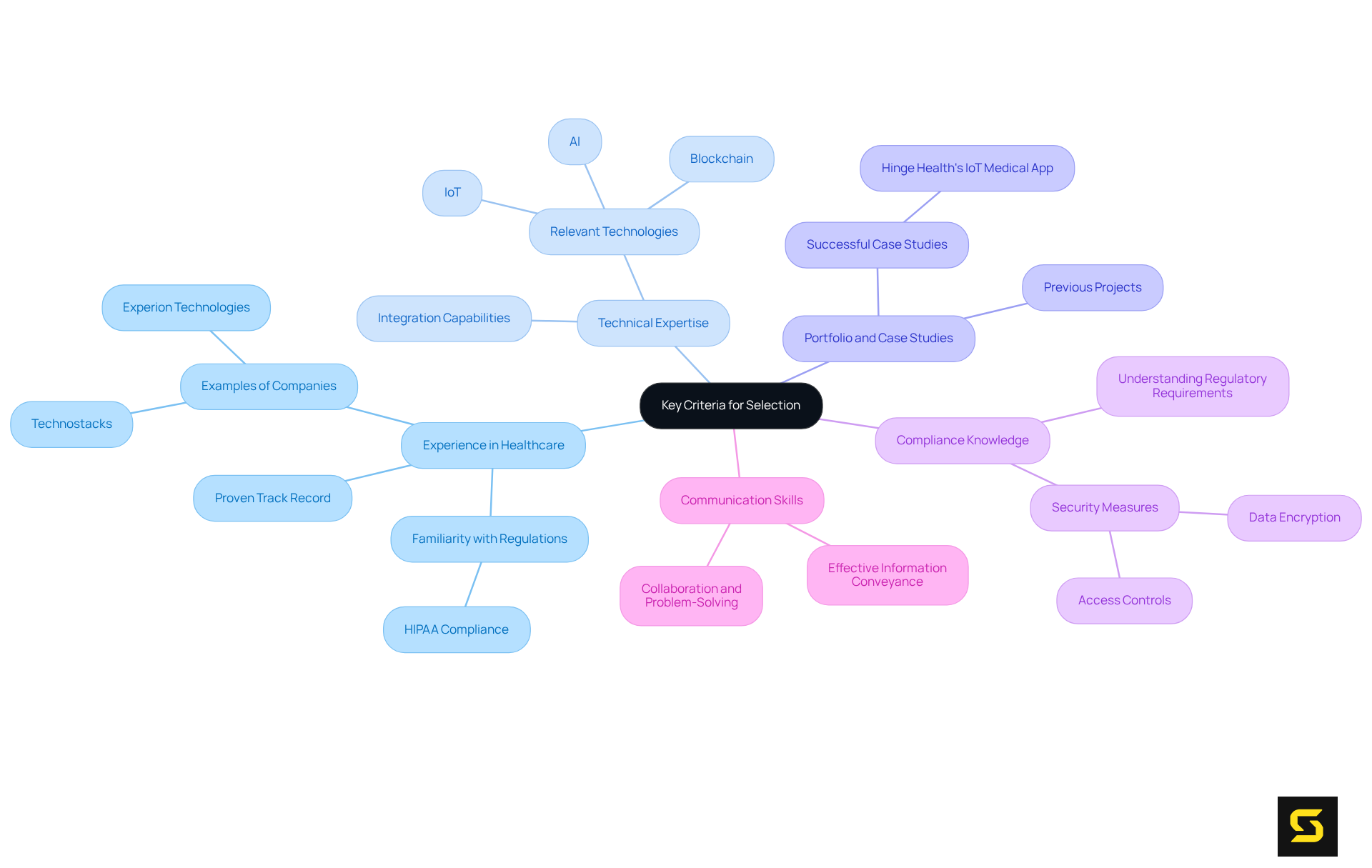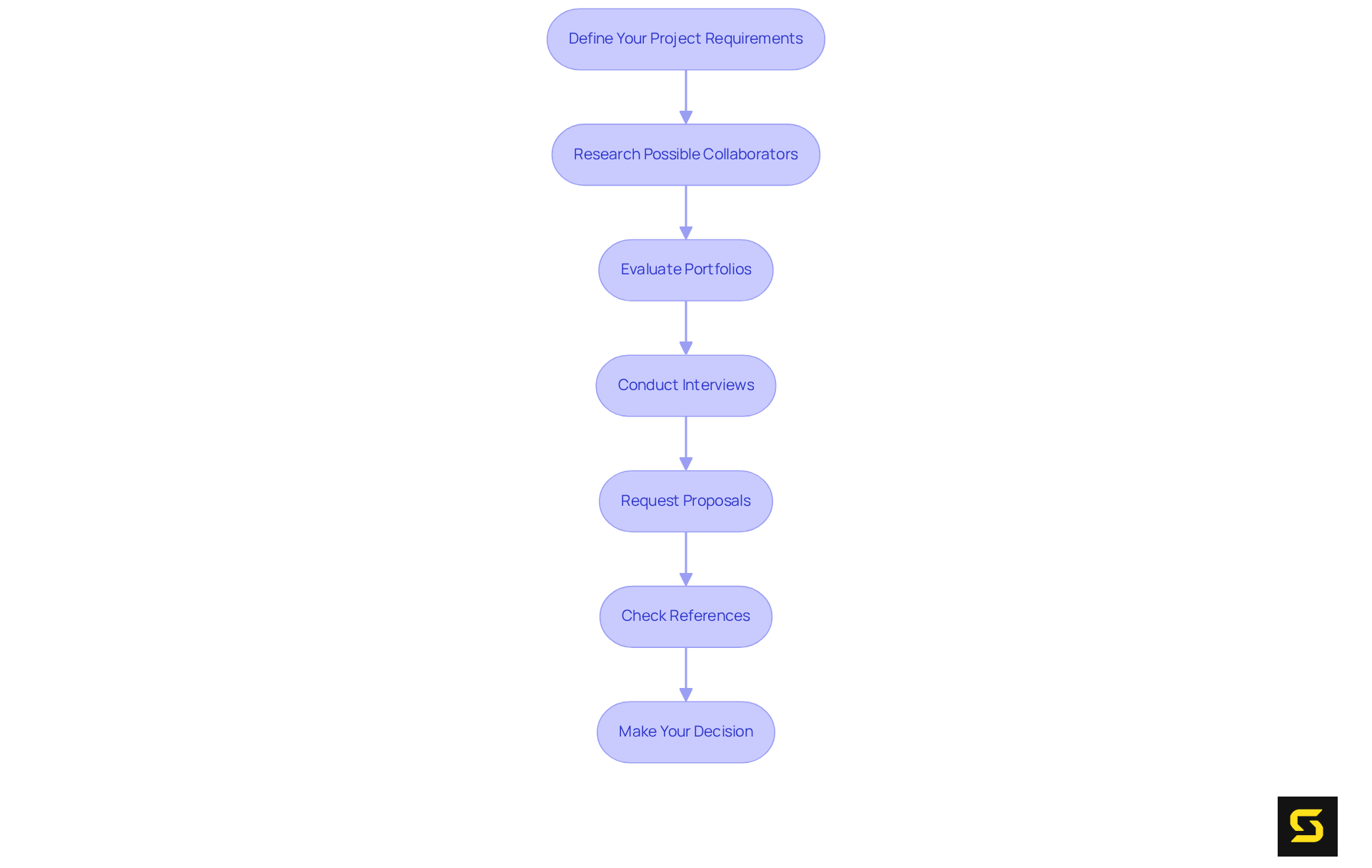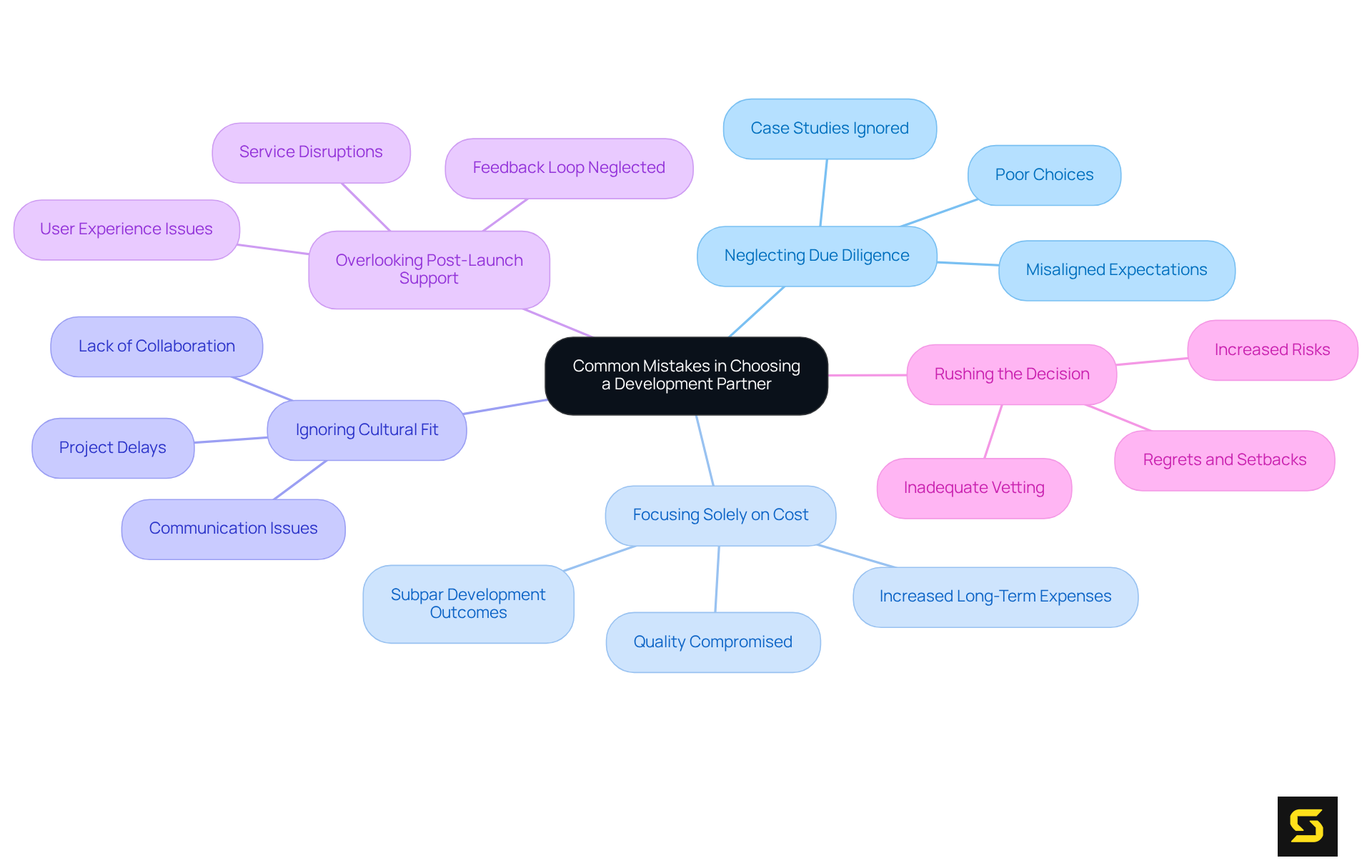Overview
This article presents a comprehensive guide for selecting the right healthcare app development company, underscoring the critical importance of experience, technical expertise, and regulatory compliance. By detailing essential criteria for selection—such as evaluating portfolios, conducting thorough interviews, and steering clear of common pitfalls—it ensures that the chosen partner aligns seamlessly with project goals and adheres to industry standards. Engage with this guide to make informed decisions that elevate your healthcare app development endeavors.
Introduction
The rapid evolution of healthcare technology underscores the critical importance of selecting the right app development company. As the demand for innovative healthcare applications escalates, organizations encounter the formidable challenge of identifying a partner who not only comprehends the complexities of medical software but also adheres to rigorous regulatory standards.
This guide explores the essential criteria and strategic steps necessary for choosing a healthcare app development company capable of transforming visionary ideas into effective solutions, while steering clear of common pitfalls that can derail projects.
How can stakeholders ensure they make the optimal choice in a crowded marketplace?
Understand Healthcare App Development Basics
The healthcare app development company plays a pivotal role in the creation of medical applications to enhance the delivery of healthcare services. For developers at a healthcare app development company, understanding the various types of applications is essential to make a significant impact in the medical field.
- Types of Apps: A diverse range of healthcare applications serves specific functions, such as patient management systems that streamline administrative tasks, telemedicine platforms enabling remote consultations, and wellness apps focused on lifestyle tracking and preventive care. Notably, the demand for telemedicine solutions developed by healthcare app development companies is projected to surge in 2025, with over 60% of U.S. patients having recently engaged with virtual care. The rise of telehealth, underscored by a staggering 38-fold increase in usage since 2020, illustrates the growing trend in this sector for healthcare app development companies.
- Regulatory Compliance: Navigating regulatory frameworks like HIPAA and GDPR is imperative, as these laws safeguard patient data privacy and security. Failure to comply can result in severe repercussions, including hefty fines or the prohibition of app launches. Therefore, a healthcare app development company must prioritize robust security measures from the very beginning.
A comprehensive understanding of the technology stack is crucial for successful projects in a healthcare app development company. Common programming languages such as JavaScript and PHP, alongside frameworks like React and Angular, are favored for crafting responsive user interfaces. The technology chosen by the healthcare app development company can profoundly influence the app's performance and scalability.
User Experience: Emphasizing is vital for a healthcare app development company to ensure that medical applications are both intuitive and accessible. This focus not only enhances user satisfaction but also fosters patient engagement. Essential features include clear navigation, large buttons, and accessibility options for a diverse user base, all of which are critical for building trust and usability. As highlighted by Netscape Labs, crafting curated and intuitive interfaces is particularly important for older or less tech-savvy users.
In conclusion, a healthcare app development company must ensure that the successful development of medical applications relies on a comprehensive understanding of various application types, strict adherence to regulatory standards, the strategic use of technology, and a steadfast focus on user experience. Furthermore, the global digital wellness market is set to grow from $376.68 billion in 2024 to over $1.5 trillion by 2032, emphasizing the critical need for investment in a healthcare app development company.

Identify Key Criteria for Selection
When selecting a healthcare app development company, several key criteria should guide your decision-making process:
- Experience in Healthcare: Prioritize companies with a proven track record in healthcare app development. Their familiarity with industry-specific challenges and regulations, such as HIPAA compliance, is crucial for navigating the complexities of medical technology. Firms like Technostacks and Experion Technologies, recognized as a healthcare app development company, have successfully completed numerous medical projects, showcasing their proficiency in this area. Notably, the medical mobile application creation sector is projected to reach $190 billion by 2025, underscoring the increasing demand for skilled programmers.
- Technical Expertise: Assess the technical skills of the development team, focusing on their proficiency in relevant technologies such as IoT, AI, and blockchain. The integration of these technologies can significantly enhance app functionality and patient outcomes. The Internet of Medical Things (IoMT), for instance, is revolutionizing patient monitoring and data management, making technical expertise essential for effective healthcare solutions.
- Portfolio and Case Studies: Review the organization's previous projects to gauge their capability and the quality of their work. Successful case studies, such as Hinge Health's IoT medical app, illustrate how effective app development can lead to improved patient engagement and health management. Organizations like Brainvire, a leading healthcare app development company, have established a strong reputation for providing data-driven solutions customized for medical businesses, further demonstrating their expertise.
- Compliance Knowledge: Ensure the company understands regulatory requirements and can implement necessary security measures. Compliance with regulations like HIPAA and FDA is non-negotiable, as it protects sensitive patient data and mitigates legal risks. The NineHertz, a leading healthcare app development company, has built a reputation for creating secure, user-friendly medical applications that meet stringent standards by implementing robust security measures and encryption protocols to safeguard patient information.
- Communication Skills: Assess their capacity to convey information effectively, as this will be vital throughout the creation process. Clear communication fosters collaboration and helps anticipate potential roadblocks, ensuring that the project stays on track and meets deadlines. As Stephen Beer, a content writer, emphasizes, choosing a medical application creation partner isn’t just about locating someone who can code — it’s about discovering a firm that comprehends the unique challenges and nuances of the medical sector.

Follow a Step-by-Step Selection Process
To effectively select a healthcare app development company, it is essential to follow these strategic steps:
- Define Your Project Requirements: Begin by clearly outlining your app's goals, target audience, and essential features to establish a solid foundation for your project.
- Research Possible Collaborators: Leverage online resources, industry reports, and referrals to compile a comprehensive list of potential firms that align with your vision.
- Evaluate Portfolios: Scrutinize the portfolios of selected firms to assess their experience and expertise in healthcare app creation, ensuring they possess a proven track record.
- Conduct Interviews: Schedule interviews with potential partners to discuss your project in detail, gauging their understanding and enthusiasm for your objectives.
- Request Proposals: Solicit detailed proposals that outline their approach, timelines, and costs, providing you with a clearer picture of their capabilities.
- Check References: Reach out to former clients to gather insights on their experiences with the firm, which will inform your decision-making process.
- Make Your Decision: Ultimately, choose the partner that best aligns with your project goals, budget, and communication style, ensuring a successful collaboration.

Avoid Common Mistakes in Choosing a Development Partner
To ensure a successful selection process, it is crucial to avoid these common mistakes:
- Neglecting Due Diligence: Failing to conduct thorough research on potential partners can lead to poor choices. Always check references and review portfolios to understand their capabilities and past performance. Neglecting this step can result in misaligned expectations and project failures, as evidenced by case studies where teams overlooked the importance of assessing a software creation firm's track record.
- Focusing Solely on Cost: While budget considerations are important, prioritizing cost over quality can lead to subpar development outcomes and increased long-term expenses. Statistics indicate that choosing the cheapest option often results in higher costs due to poor-quality work and delays, ultimately compromising the project's success. Numerous businesses that opted for low-cost agencies faced significant challenges, as highlighted in various case studies.
- Ignoring Cultural Fit: A mismatch in organizational culture can lead to substantial communication issues and project delays. It is essential to ensure that the partner in progress shares your values and work ethic to cultivate a collaborative atmosphere that enhances productivity. Expert insights affirm that cultural alignment is critical for smooth project execution.
- Overlooking Post-Launch Support: Selecting a partner that provides ongoing support and maintenance after the app is launched is vital. This ensures that any issues that arise can be promptly addressed, preventing potential disruptions in service and user experience. Experts emphasize the necessity of establishing a feedback loop early on to maintain service quality.
- Rushing the Decision: Taking the time to evaluate all options thoroughly is imperative. A hasty decision can lead to regrets down the line, as demonstrated by cases where companies encountered setbacks due to inadequate vetting of their development partners. Proper due diligence not only mitigates risks but also enhances the likelihood of a successful project outcome.

Conclusion
Selecting the right healthcare app development company is paramount for the success of any medical application. A well-informed decision is rooted in a thorough understanding of the complexities involved in healthcare app development, encompassing the various types of applications and the regulatory requirements that govern them. By prioritizing companies that exhibit technical expertise, industry experience, and a commitment to user-centered design, stakeholders can ensure their projects not only comply with standards but also deliver exceptional user experiences.
Key factors for choosing a healthcare app development partner have been emphasized throughout this article. Assessing a company's track record in healthcare, evaluating their technical capabilities, reviewing past projects, and confirming a solid understanding of compliance requirements are all critical steps. Additionally, effective communication and robust post-launch support are essential components that contribute to a successful partnership. Avoiding common pitfalls such as hastily making decisions or concentrating solely on cost can significantly enhance the likelihood of fruitful collaboration.
In the rapidly evolving digital health landscape, the importance of selecting the right development partner cannot be overstated. As the demand for innovative healthcare solutions continues to rise, investing time and resources into choosing a competent healthcare app development company will yield long-term benefits, including improved patient engagement and enhanced health outcomes. By adhering to the outlined steps and steering clear of frequent mistakes, organizations can navigate this complex selection process with confidence, ultimately paving the way for a brighter future in healthcare technology.
Frequently Asked Questions
What is the role of a healthcare app development company?
A healthcare app development company is crucial in creating medical applications that enhance the delivery of healthcare services.
What types of healthcare applications are commonly developed?
Common types of healthcare applications include patient management systems, telemedicine platforms for remote consultations, and wellness apps focused on lifestyle tracking and preventive care.
What is the projected demand for telemedicine solutions?
The demand for telemedicine solutions is projected to surge in 2025, with over 60% of U.S. patients having recently engaged with virtual care.
How has telehealth usage changed since 2020?
Telehealth usage has increased by 38-fold since 2020, highlighting a growing trend in healthcare app development.
Why is regulatory compliance important in healthcare app development?
Regulatory compliance with laws like HIPAA and GDPR is essential to safeguard patient data privacy and security. Non-compliance can lead to severe penalties, including fines or app launch prohibitions.
What technology stack is commonly used in healthcare app development?
Common programming languages include JavaScript and PHP, while frameworks like React and Angular are favored for creating responsive user interfaces.
How does the choice of technology affect healthcare apps?
The technology chosen by a healthcare app development company can significantly impact the app's performance and scalability.
What is the importance of user experience in healthcare app development?
Emphasizing user-centered design is vital to ensure medical applications are intuitive and accessible, enhancing user satisfaction and fostering patient engagement.
What features are essential for improving user experience in healthcare apps?
Essential features include clear navigation, large buttons, and accessibility options to accommodate a diverse user base, which are critical for building trust and usability.
What is the expected growth of the global digital wellness market?
The global digital wellness market is projected to grow from $376.68 billion in 2024 to over $1.5 trillion by 2032, highlighting the need for investment in healthcare app development.





